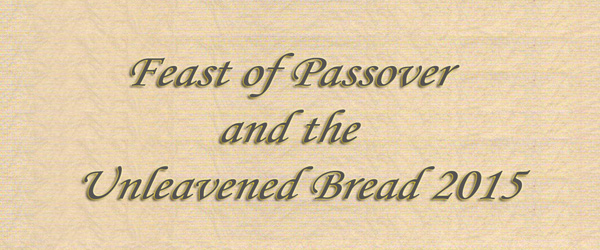
Introduction
Passover is kept on the fourteenth day of the first month of Abib,
Passover is kept on the fourteenth day of the first month of Abib,
The Passover as well as the feast of the unleavened bread are observed sequentially. Passover is kept on the fourteenth day of the first month of Abib, also called the month of Nisan. This is the first month of the Jewish calendar according to the instructions given to the children of Israel by Elohim as recorded in Exodus 12:1. Passover is a time for purification, sanctification and redemption. Israelites ate the Passover for their redemption from slavery in Egypt, whereas today we partake the Passover feast as a commemoration of the priceless gift of salvation through the blood of Yahshua.
God gave the children of Israel instructions on how to eat their first Passover, a plan that would bring forth their redemption from bondage. They were to sacrifice a one year old male lamb with no blemish, in the evening of the fourteenth day of Abib. They were also supposed to use the blood of the lamb and apply it on the upper and the two side posts of their doors. On the same night, an angel of death would pass through the land of Egypt and kill all the firstborns of the Egyptians.
However, all households that had the blood of the lamb on their doors were passed over and therefore, protected from death. In other words, the Jews who understood the secret concept of Passover were saved from death by the blood of the Lamb.
Similarly, we will be saved from death and eternal condemnation on the Day of Judgment through the blood of the Lamb of God, Yahshua the Messiah.
Halleluyah!! The book of John 6:53-54 tells us that whoever eats the flesh and drinks the blood of Yahshua has eternal life in him and that he will be raised up on the last day. During the last supper, Yahshua was seated in the upper room, and he clearly demonstrated to his apostles what he meant by "eating my flesh and drinking my blood." He is the bread of life and therefore the unleavened bread that is prepared and eaten during the feast of Passover symbolizes his flesh whereas the blood from the grapes (unfermented juice from the grapes) symbolizes his blood.

Just like the Passover lamb was supposed to be without blemish, the bread for the Passover (matzah) must be free from any leaven. Yeast symbolizes sin particularly the sin of hypocrisy and pride as recorded in Mark 8:15, and that is why the bread must be free from leaven. It is a command by God to shun all leavened products during the Passover and the feast of unleavened bread. "And on the fifteenth day of the same month, is the feast of Unleavened Bread to the LORD; seven days you shall eat unleavened bread." Leviticus 23:6 In obedience to this command (Exodus 12:15), Jews usually remove leaven from their houses. They literally empty, clean and wipe all places especially the kitchen until it sparkles as though it is new in order to remove leaven products before Passover begins.
More so, it is a time to avoid sin at all costs. The bible explains that "A little yeast works through the whole batch of dough." Galatians 5:9. Yeast is a fungus that causes dough to rise by burning the sugars and emitting carbon dioxide as a byproduct. Yeast is so pervasive and just like the way it consumes sugars in the dough, sin eats away at us. When sin finds its way into our lives, we become separated from God. "But your iniquities have separated you from your God; your sins have hidden His face from you, so that He will not hear." Isaiah 59:2

We find the Apostle Paul exhorting the believers in Corinth to get rid of the sin of malice and wickedness, in order to live the holy life they are truly capable of living, free from the bondage to sin. "Therefore, purge out the old leaven, that you may be a new lump, since you truly are unleavened. For indeed Messiah, our Passover lamb was sacrificed for us. Therefore let us keep the Feast (of Passover & Unleavened Bread), not with the old bread leavened with malice and wickedness, but with the unleavened bread of sincerity and truth." 1 Corinthians 5:7-8